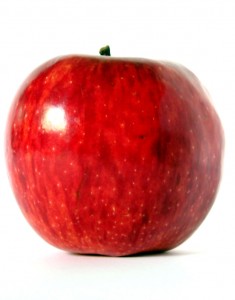 I heard an interesting commentary on Catholic radio recently about the good in sin. Yes, you read that right. But hold on. I'm not saying that sin is good. I said the good in sin.
I heard an interesting commentary on Catholic radio recently about the good in sin. Yes, you read that right. But hold on. I'm not saying that sin is good. I said the good in sin.
Think about it, and go back as far as you need to, even to that original sin; the one in the garden where Adam and Eve were offered some particularly juicy and delicious fruit. Now, there's nothing wrong with apples, is there? I love apples! I have a can of caramel sauce in our fridge to make them extra yummy. And my husband's grandmother makes the best apple pie in the world (I think extra cinnamon is her secret ingredient).
Apples are very good indeed. But we all know that the original apple was no regular piece of fruit. It was extraordinary; it promised all sorts of wonderful things. Knowledge for example. And what's wrong with a little knowledge? Not a thing, unless it comes at the wrong time.
Think of the knowledge you have as a parent. Is all of that information appropriate or even safe for your children? Not necessarily. Likewise, God knew that Adam and Eve couldn't handle the knowledge that had been presented to them, not because God was a mean God who wanted to deny His children something wonderful, but because He knew that it would hurt them to have this special knowledge at this time and in this place.
The same is true of most sin. There are the exceptions, of course, but take the sin of stealing, for one. The good in this sin (not of this sin) might the desire to do well, to be successful. But of course with sin there's always that little twist, that bit of wrong that poisons the whole thing, makes it rotten.
It's easy to see in this one example that because there is a strain of good in most sin, we can easily be misled. We can be enticed by the good and not recognize the well of poison at the core.
Sin isn't the easiest thing to talk or even think about. Many people are repelled by the mere mention of it, even to the point of denial that it exists. Others have had sin jammed down their throats and simply go numb. Many have not been able to acknowledge their sins because it's painful to look inside and acknowledge we've chosen wrongly. Throw in a splash of good and it's easy to see why it can be tricky to fairly assess our sins.
I think we're all guilty of this last one. It's a lifelong process to hold our failings up to the light and examine them for what they are, but it's a worthwhile endeavor to sort through the sin in our lives so that we can confess it and, in doing so, be free to more fully do God's will. It really is about love in the end.
I've worked hard to acknowledge the sin in my life and will continue to do so, but somehow, this understanding of the existence of good in sin has helped me realize just how tempting it can be to believe we're doing a good when, in fact, we're really bringing harm to ourselves and others through a certain action. Recognizing the good in sin helps me to understand why I have been drawn to it at different points in my life, and why it's so vitally important for me to take stock of which apples are truly healthy and which contain poison.
Lent is partially about taking stock of our fruit bins and ridding them of as many rotten apples as possible. That way, when Easter rolls around, we'll be more able to truly indulge in the banquet.
Q4U: Is sin a topic you approach with hesitation, or do you welcome the chance to sort through your bin and clear the way toward a more fruitful existence?
Copyright 2011 Roxane Salonen
About the Author

Roxane Salonen
Roxane B. Salonen, Fargo, North Dakota (“You betcha!”), is a wife and mother of a literal, mostly-grown handful, an award-winning children’s author and freelance writer, and a radio host, speaker, and podcaster (“ Matters of Soul Importance”). Roxane co-authored “ What Would Monica Do?” to bring hope to those bearing an all-too-common cross. Her diocesan column, “ Sidewalk Stories,” shares insights from her prolife sidewalk ministry. Visit RoxaneSalonen.com


.png?width=1806&height=731&name=CatholicMom_hcfm_logo1_pos_871c_2728c%20(002).png)
Comments